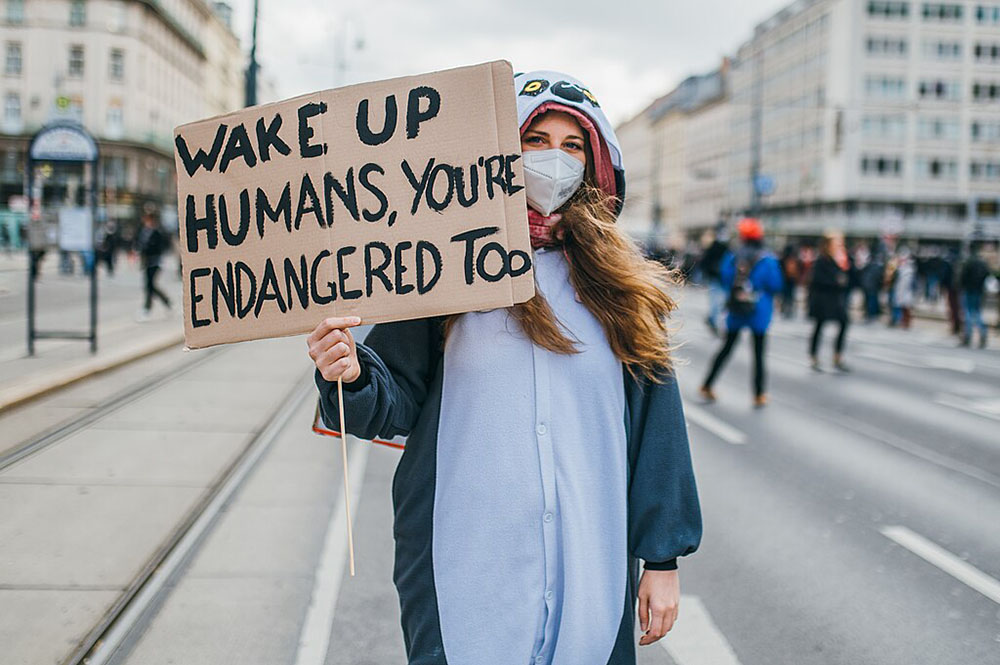Photo Credit: Ivan Radic
We human beings are animals, like millions of other species who move about the earth, communicate vocally and visually, gather, harvest, and/or hunt other species for food, and manipulate pieces of our habitat to make our survival more likely. We, too, have sex, feed and care for our young, play, form bonds with others of our species, and feel anger, fear, and loneliness. In countless ways, we are no better or worse than other inhabitants of Earth.
And we are a different kind of animal. We have speech that can be recorded in script or print. We have taken intellect to levels of creative, abstract, and manipulative thinking that have totally outstripped that of other beings. We have developed technologies that transform elements of other species into substances that serve only us and that have made us masters of the environment to the detriment and demise of many other species. We rule our world – and we have achieved that because we realized millenia ago that we could. We have convinced ourselves that we are essentially selfish, greedy, and insatiable, and that that is more than OK. We are the only species on the planet with that kind of hubris – and foolhardiness.
We have mechanized and toxified nature well past the point of our own safety, and made of our home, Earth, a ruins. Because we are addicted to material progress and the accumulation of wealth, we have undermined the original sources of that wealth – the soil, and the masses of our kind who have been relegated to work that soil and extract from it the minerals that have made a tiny minority of us filthy, amorally rich. As a species, we have no allegiance to the land, to nature, or to Earth, let alone to each other or other kinds of beings. We have ignored the centuries old wisdom of many Indigenous peoples who know that nothing of what surrounds us, from the tiniest microbe to other beasts that dwarf us, belongs to us, but rather that we belong with all of them. Out of that ignorance and hubris, we have extracted and manipulated every substance and life form that has held the promise of serving our needs and desires. Our ethic has been, if we can make it work – for us – at whatever external cost to other species and our environment – and if we can count our gain from that self-serving, privatizing enterprise in dollars, then it is deemed “good” – for everyone, or at least for every human being.
But that inherently inefficient calculus has brought us to obscene collective excess and luxury for only an increasingly elite few. In its wake it has left incalculable and undeniable needs, from sufficient oxygen in our oceans to assure the survival of countless species to the money, labor, and skills to take proper, loving care of our children, our sick and disabled, and our elders. The work of care, in general, has not been valued enough, particularly in economic terms, to maintain the health of whatever beings have been unjustly exploited or have not been tapped to make a profit. The work of making money has come to dominate our lives and habitat to the extent that we are convinced that that is why we are here. But in truth we are here to take care of and joy in each other. The emergence and persistence of catastrophic diseases and the dramatic increase in mental illness are no accident. They are the logical and predictable consequence of our belief that we could solve all our problems with money and the technology driven by the profit motive.
The jig is up. If we don’t turn our attention, right now, to taking care of our brothers, sisters, and nonbinary siblings, i.e., all the Earth’s flora and fauna, and every member of the human family, we face the continued crumbling of our civilization and more importantly our natural world. We must pour all of our talents and resources into building justice for the Earth and all its inhabitants. The path to do that is determining together what resources are sufficient to ensure the survival and thriving of each species. That means we humans, as the keystone species, must give up prioritizing our needs and desires and pursuing excess wealth, i.e., any use of resources that ignores or harms the well-being of other species or each other. We must attack wealth inequity and ensure that every species has sufficient nourishment, habitat, and care. We must now center care, global justice, and sufficiency.

